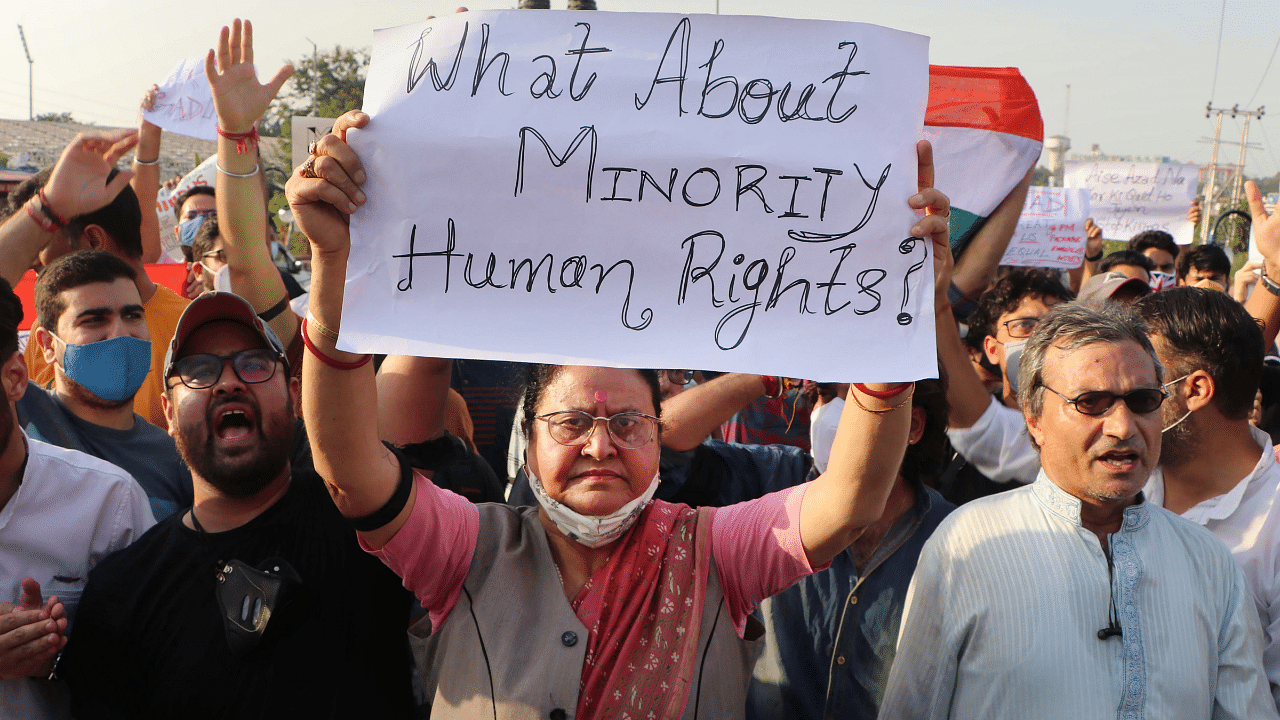
As part of the Concerned Citizens Group led by former Union Minister Yashwant Sinha, we had visited Jammu and Kashmir several times and prepared nine reports, the last being in July this year. What led to the current situation is the continued anger and frustration at what has been done to Kashmiris over the last more than two years. Whoever are the enemies of India and Jammu and Kashmir, they have chosen their targets – Sikh women, Kashmiri Pandit and school teachers – very astutely because it has the maximum impact. The whole issue has exposed India’s communal fragility.
However, one important point that you would certainly note is that amid the gloom, there was a very strong condemnation of the brutal acts of violence which cut across the political, religious and ideological divide in the valley. This is very important because, for the first time in the last half a century, the majority community actually took out a procession, raised slogans against Pakistan for what had been done. Separatist leaders, mainstream politicians, imams, community elders, civil society, all made very strong appeals to Kashmiri Pandits and Sikhs not to panic or migrate. From the worst kind of a situation, we saw glorious humanism at its best.
Also Read | Now, minorities targeted in Kashmir
When the Narendra Modi government assumed power in 2014, the impression they gave and appeared to the civil society in the country by and large that the only agenda they had was the Kashmiri Pandits. Seven years down the line, all that has become absolutely clear is that they have done zilch for this community. The latest spate of attacks has shown that the current dispensation cannot even ensure security for the people.
Whatever has been done post-August 5, 2019 has been at the cost of the well-being and security of the people. There’s resignation, fear, apprehension and a huge sense of uncertainty after the stealing of Kashmiri identity that was assured constitutionally through Article 370 and the rare breakup of a state into two Union Territories. This has caused anger and hatred and that has got further fuelled up by the action that has been taken through the killings in the recent past.
The revocation of special status led to a lockdown in Kashmir for almost nine months. First, the political lockdown and then, unfortunately, the pandemic-induced lockdown. One would know what that did to the psychology, emotions, economy and well-being of the people in the Valley. The political lockdown was our own creation, nature had nothing to do with it. Then there was the discourse on domicile and protection of properties among others. The media was not permitted to file its stories from Kashmir. Now, that is not democracy.
Also Read | Killings in Kashmir: Political outreach, a must
First and foremost, as far as I know, the government has no Kashmir policy other than certain ideological predilections. The government has chosen to be in a triumvirate of what I would say denial, delusion and hallucination. First, you deny to yourself that there is a problem on the ground. Then the problem is staring the government on the face.
What needs to be done first is to understand the problem. That means in many ways, we look at the problem of youth. Unless that is understood and addressed, terrorism will go on for another 30 years. For example, youth on social media can be contacted, advised, counselled for which elders and civil society can be employed. Unfortunately, what happens, in contrast, is, they are pushed into peril through hard, muscular policies. No attempt is made to bring them back and then, it becomes even worse than they already are.
Then the second is the challenge of socio-cultural and religious groupings which are in essence also deeply political and have linkages across the Line of Control (LoC). That challenge has not been taken on politically. Until that is done, because of their linkage across the LoC and the level of anger, the presence of certain elements in schools, colleges, academia and business, makes them all-encompassing in terms of a challenge.
Unfortunately, our policy has been to use a security prism for every challenge we face in Kashmir. That is why we are in the mess we are. What is needed is political outreach, followed by dialogue, with the people in Kashmir Valley. I would say it should be enlarged into the whole of Jammu and Kashmir.
We also need normalisation of relations between India and Pakistan. But unfortunately, both Kashmir and Pakistan are very useful weapons to polarise the rest of India, especially during elections. We are now transformed from a vibrant democracy to a selfish ‘electocracy’ whose only purpose is to win elections and to be in power regardless of the cost that the nation pays.
Everywhere you have elections, the delimitation does not come in the way of elections in 29 or 30 states of India. Delimitation is allowed to be a factor in Jammu and Kashmir because the aim is not to have democracy there. Delay the election as much as possible so that whatever is intended to be done in the state can be done stealthily.
Watch the latest DH Videos here: